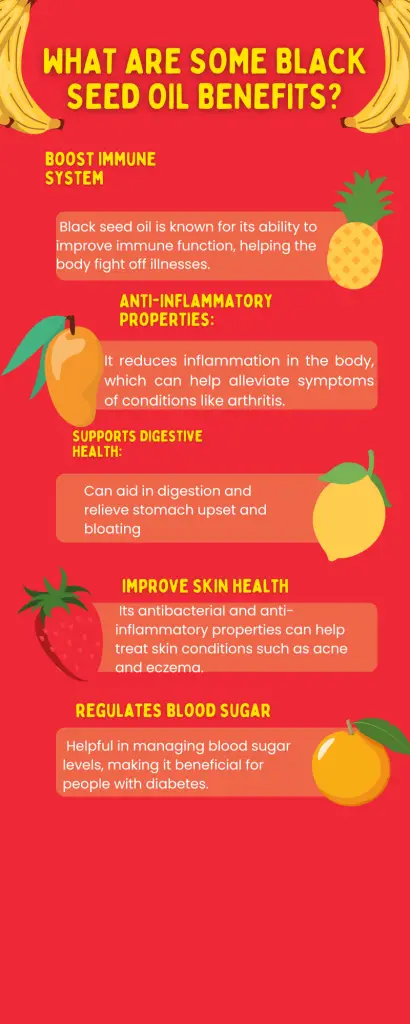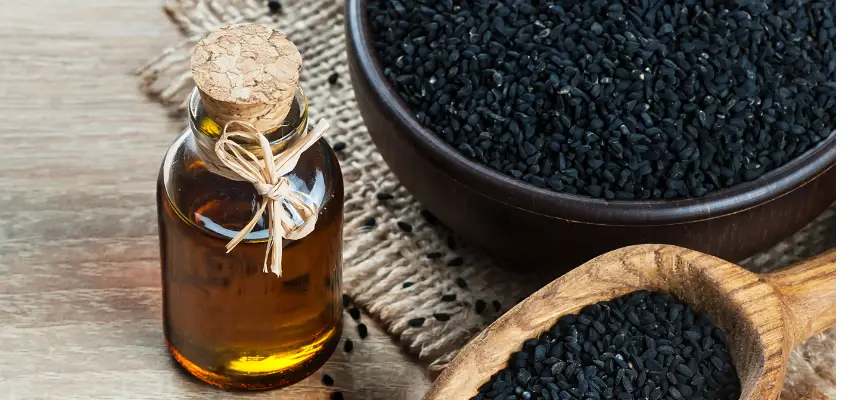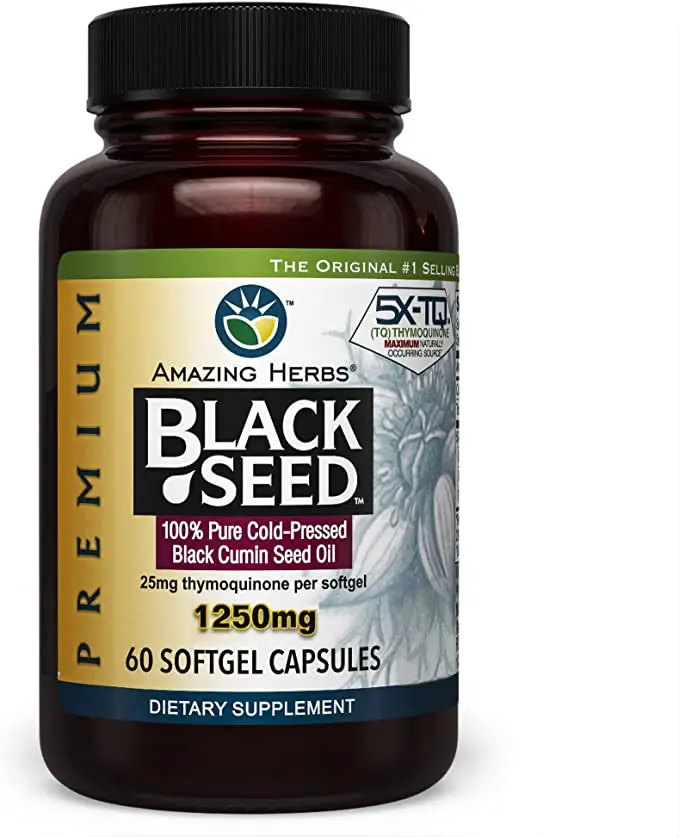Black seed oil is a popular natural remedy that has been used for centuries in traditional medicine. It is believed to have various health benefits, including reducing high blood pressure, inflammation, improving skin health, and lowering cholesterol levels.
Black Seed Oil and High Blood Pressure
One of the potential uses of black seed oil is for high blood pressure. High blood pressure, also known as hypertension, is a common health condition that can lead to serious complications such as heart disease, stroke, and kidney failure.

Some studies suggest that black seed oil may help lower blood pressure.
For example, a 2013 study published in the Journal of Hypertension found that taking black seed oil capsules for eight weeks significantly reduced both systolic and diastolic blood pressure in people with mild hypertension.
In addition to its potential blood pressure-lowering effects, black seed oil may also have other cardiovascular benefits.
For instance, it has been shown to improve cholesterol levels by reducing LDL cholesterol (the “bad” cholesterol) and increasing HDL cholesterol (the “good” cholesterol).
Black Seed Oil and High Blood Pressure Benefits
Furthermore, black seed oil may have antioxidant and anti-inflammatory properties, which could be beneficial for reducing the risk of heart disease and other chronic health conditions.
Some studies have also suggested that black seed oil may have a positive effect on blood sugar levels, which could be beneficial for people with diabetes.
Side Effects of Black Seed Oil
It is also important to be aware that some people may experience side effects from black seed oil, such as upset stomach, allergic reactions, or interactions with medications.
Overall, while black seed oil may have potential health benefits, more research is needed to fully understand its effects on high blood pressure and other health conditions.
It is important to consult with a healthcare professional before using black seed oil or any other natural remedy.
Other Benefits for Black Seed Oil
In addition to the potential cardiovascular benefits of black seed oil, there are several other potential health benefits that have been studied.
For example, black seed oil has been shown to have anti-inflammatory and antimicrobial properties, which could be useful in treating various types of infections and inflammatory conditions.
Black seed oil has also been studied for its potential anticancer effects.
Some research suggests that black seed oil may be able to inhibit the growth of cancer cells in certain types of cancer, although more research is needed to fully understand its potential as a cancer treatment.

Other potential benefits of black seed oil include improved digestive health, reduced symptoms of asthma and allergies, and improved cognitive function.
However, more research is needed to confirm these potential benefits and to understand the optimal dosage and safety of black seed oil for different health conditions.
Dosage of Black Seed Oil
The appropriate dosage of black seed oil can vary depending on the individual and the intended use.
It is important to follow the instructions on the product label or to consult with a healthcare professional before using black seed oil.
In general, most studies on the potential health benefits of black seed oil have used doses ranging from 500 milligrams to 2,000 milligrams per day, taken in divided doses.
However, it is important to start with a lower dose and gradually increase it as tolerated, as some people may experience side effects such as upset stomach or allergic reactions.
It is also important to be aware that black seed oil can interact with certain medications, including blood thinners, antihypertensive medications, and diabetes medications. Therefore, it is important to consult with a healthcare professional before using black seed oil if you are taking any medications or have any underlying health conditions.
Overall, the appropriate dosage of black seed oil will depend on the individual and the intended use, and it is important to approach it with caution and under the guidance of a healthcare professional.
Thymoquinone
Thymoquinone is a bioactive compound found in black seed oil.
It is believed to be responsible for many of the potential health benefits of black seed oil, including its antioxidant, anti-inflammatory, and anticancer effects.

Black Seed Oil Research: Thymoquinone
Research has shown that thymoquinone may be able to inhibit the growth of cancer cells in various types of cancer, including breast, lung, colon, and pancreatic cancer.
Thymoquinone has also been shown to have anti-inflammatory effects, which could be beneficial for reducing the risk of chronic inflammatory conditions such as arthritis, diabetes, and cardiovascular disease.
Additionally, thymoquinone has been shown to have antioxidant effects, which could be useful for protecting against oxidative stress and reducing the risk of age-related diseases.
Some studies have also suggested that thymoquinone may have a positive effect on blood pressure, cognitive function, memory, and mood.
While thymoquinone shows promise as a potential natural remedy for various health conditions, more research is needed to fully understand its effects and potential risks. It is important to consult with a healthcare professional before using black seed oil or any other natural remedy for any health condition.
Conclusion
In conclusion, black seed oil is a popular natural remedy that has been used for centuries in traditional medicine.
While there is some evidence to suggest that it may have potential health benefits, more research is needed to fully understand its effects and safety.
In particular, black seed oil has been studied for its potential blood pressure-lowering effects and cardiovascular benefits, as well as its potential as a treatment for cancer and other health conditions.
However, it is important to approach black seed oil with caution and to consult with a healthcare professional before using it for any health condition.
What are some dangers of high blood pressure?
What are some alternative remedies to help high blood pressure?
Is serrapeptase beneficial for high blood pressure?
Facts About High Blood Pressure
Sinusitis and High Blood Pressure
Magnesium Taurate Dosage for High Blood Pressure
Castor oil for high blood pressure
- Ahmad A, Husain A, Mujeeb M, et al. A review on therapeutic potential of Nigella sativa: A miracle herb. Asian Pac J Trop Biomed. 2013;3(5):337-352. doi:10.1016/S2221-1691(13)60075-1
- Kooti W, Hasanzadeh-Noohi Z, Sharafi-Ahvazi N, Asadi-Samani M, Ashtary-Larky D. Phytochemistry, pharmacology, and therapeutic uses of black seed (Nigella sativa). Chin J Nat Med. 2016;14(10):732-745. doi:10.1016/S1875-5364(16)30088-0
- Sahebkar A, Beccuti G, Simental-Mendía LE, Nobili V, Bo S. Nigella sativa (black seed) effects on plasma lipid concentrations in humans: A systematic review and meta-analysis of randomized placebo-controlled trials. Pharmacol Res. 2016;106:37-50. doi:10.1016/j.phrs.2016.02.008
My name is Phyllis Robinson MSN, RN. I have been a Registered Nurse for 27 years in the Cardiac Intensive Care Unit. I am passionate about cardiac care and heart disease. I also want this blog to be an educational tool that people can refer to for traditional and alternative treatment. I will blog on heart disorders such as high blood pressure, congestive heart failure, cardiomyopathy, and high cholesterol.
I received my Nursing degree from Baltimore Community College.
I went on to receive my Masters in Nursing from Walden University
I have worked for almost 30 years in Critical Care with a focus on heart health. I am an advocate of preventive healthcare.

